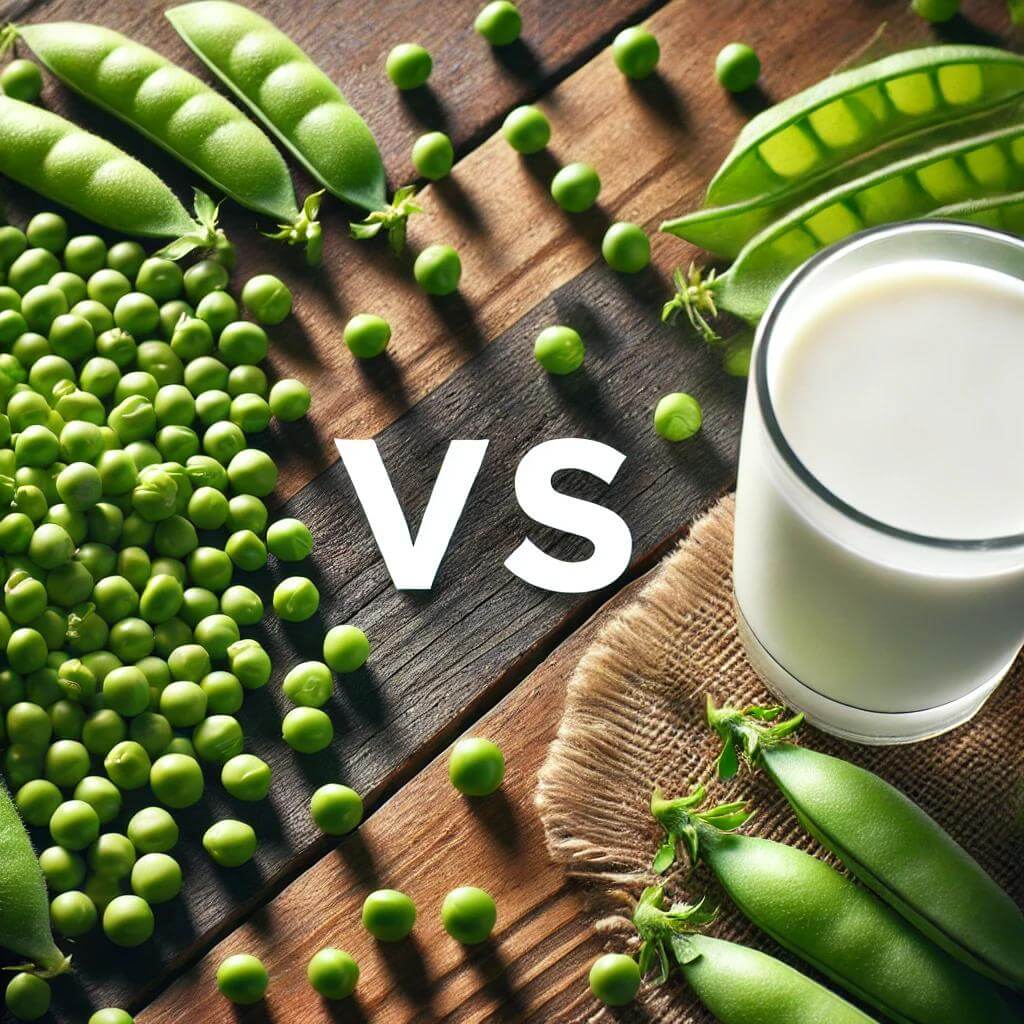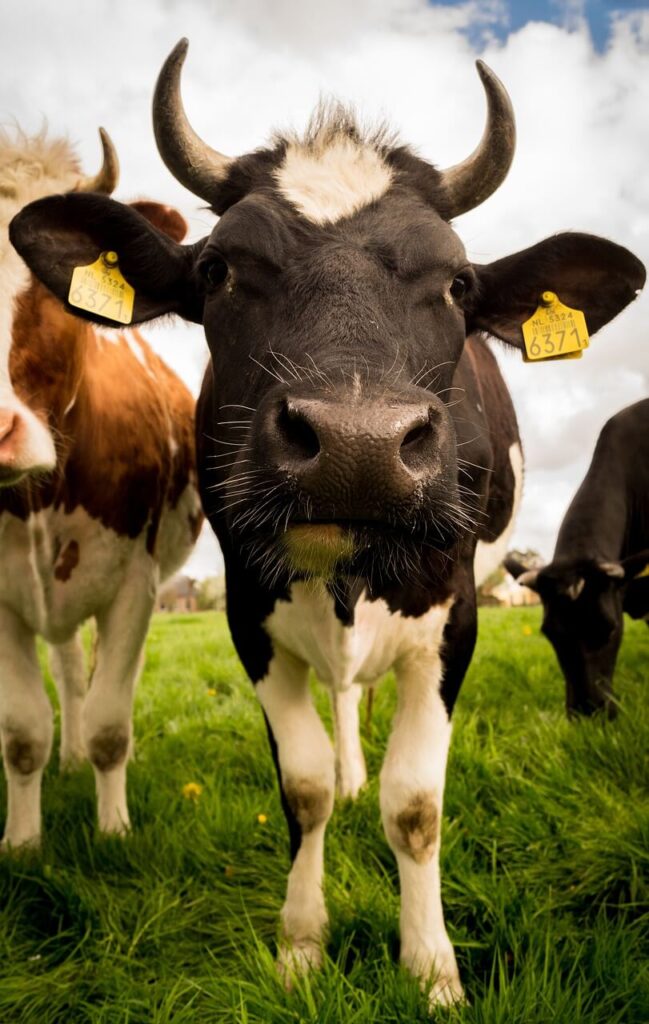Your cart is currently empty!

Pea protein vs whey isn’t really a battle when it comes to ethical considerations, and if it were this would be a very short article. But in the world of dietary supplements, protein powders have become a staple for athletes, bodybuilders, and health enthusiasts for various reasons and what type of protein is the best is a legitimate question.
Among the plethora of options available, pea protein and whey protein stand out as two of the most popular choices. This article delves into the key differences between pea protein vs whey protein, evaluating their benefits, drawbacks, and overall suitability for different needs.
Protein Supplements
Protein is an essential macronutrient necessary for muscle repair, growth, and overall health. While whole foods are the best sources of protein, protein supplements offer a convenient way to meet daily protein requirements. Whey protein has long been the gold standard, but plant-based options like pea protein and soy protein are gaining traction, especially among those following a vegan or lactose-free diet.

The Pea vs Whey Protein: Nutritional Profiles
Whey Protein: Derived from milk, whey protein is a complete protein, meaning it contains all nine essential amino acids. It is rich in branched-chain amino acids (BCAAs), which are crucial for muscle synthesis and recovery. Whey protein is quickly absorbed by the body, which is why it is popular.
Pea Protein: Pea protein, extracted from yellow split peas, is also a complete protein. While it has a slightly lower concentration of certain amino acids like methionine, it compensates by being rich in arginine and lysine, which support muscle growth and immune function.
Also, pea protein is hypoallergenic and easily digestible, making it a suitable option for those with dietary restrictions.
Health Benefits
Muscle Building and Recovery: Both pea protein and whey protein are effective for muscle building and recovery. Whey protein’s high BCAA content gives it a slight edge in promoting muscle synthesis immediately after workouts.
However, studies have shown that pea protein can be equally effective in supporting muscle growth over the long term, particularly when combined with resistance training.
Digestive Health: Whey protein, especially in its concentrate form, can cause digestive issues such as bloating and gas in individuals who are lactose intolerant (I’m not lactose intolerant and it still would mess up my stomach before I went vegan).
On the other hand, pea protein is free from common allergens like dairy, soy, and gluten, making it gentler on the digestive system.
Heart Health: Pea protein may offer additional benefits for heart health. It contains a significant amount of iron and is known to help lower blood pressure levels due to its high arginine content.
Whey protein is claimed to support cardiovascular health by improving lipid profiles, but its effects may vary based on individual tolerance to dairy.
Also, The Canadian Journal of Cardiology and other reputable sources have highlighted significant cardiovascular benefits associated with plant-based diets. A review article in the Canadian Journal of Cardiology found that plant-based meat alternatives generally have a more heart-healthy nutritional profile compared to traditional meat, despite concerns about the high sodium content in some products.1;2
Moreover, a meta-analysis in the International Journal of Cardiovascular Sciences noted that vegetarian and vegan diets are associated with lower levels of body mass index (BMI), total cholesterol, LDL cholesterol, and glucose levels compared to omnivorous diets. The study also reported a 25% reduced risk of incidence and mortality from ischemic heart disease among those following plant-based diets.3
These findings align with a growing body of evidence suggesting that plant-based dietary patterns, which emphasize higher intake of plant foods and lower intake of animal products, can confer significant cardiovascular benefits.
In summary, while both pea protein and whey protein have their benefits, incorporating plant-based protein sources like pea protein into your diet can offer additional cardiovascular advantages. This is particularly relevant for those aiming to reduce meat intake and lower the risk of cardiovascular diseases.
Dietary Considerations
For those of us that are vegan, pea protein is the obvious winner. But also for those that are not vegan but have Lactose Intolerance and Allergies. Whey protein isolates contain less lactose than concentrates, but even trace amounts can cause discomfort for some people.
Taste and Texture: Whey protein is often favored for its smooth texture and pleasant taste, which easily blends into shakes and recipes. Pea protein, while slightly grainier and having a more earthy flavour, has improved significantly in taste with advancements in food processing technologies.

Pea Protein vs. Whey Protein: Which is Better?
When comparing pea protein vs whey protein, it’s essential to understand their unique advantages and how they align with your dietary needs and health goals. While both proteins have their merits, one might be more suitable than the other depending on specific requirements.
Whey Protein Advantages:
- Rapid Absorption: Whey protein is quickly absorbed by the body, making it ideal for post-workout recovery. Its high concentration of branched-chain amino acids (BCAAs) supports muscle synthesis and repair effectively.
- Flavor and Availability: Whey protein is widely available in various flavors and formulations, making it easy to find a product that suits your taste and dietary needs.
- Muscle Growth: Whey protein has a proven track record of supporting muscle growth and overall fitness due to its high bioavailability and complete amino acid profile.
Significant Cons of Whey Protein
- Digestion, Lactose Intolerance and Allergies:
- Whey protein, derived from milk, can cause digestive issues such as bloating, gas, and cramps in lactose-intolerant individuals. It’s also unsuitable for those with dairy allergies.
- Hormonal Content:
- Contains hormones like estrogen and IGF-1, which may affect individuals sensitive to hormonal fluctuations and potentially contribute to conditions such as acne.
- Potential for Contaminants:
- Some whey protein products may contain heavy metals like lead and arsenic due to manufacturing processes, posing a risk of contamination.
- Cholesterol and Saturated Fat:
- Whey protein contains cholesterol and saturated fat, these components can contribute to increased blood cholesterol levels, particularly LDL cholesterol, which is linked to heart disease.
- Ethical and Environmental Concerns:
- Tied to the dairy industry, whey protein production is associated with high greenhouse gas emissions, significant water usage, and tremendous animal welfare issues.
- Flavour and Texture Limitations:
- Some people may find the taste of whey protein chalky or overly sweet, making it less enjoyable for regular consumption.
Pea Protein Advantages:
- Hypoallergenic and Digestible:
- Free from common allergens like dairy, gluten, and soy.
- Gentle on the stomach and less likely to cause bloating or gas compared to other proteins.
- Nutrient-Rich:
- High in Iron: Supports energy levels and overall health, especially beneficial for plant-based diets.
- Other Nutrients: Contains magnesium, folate, and potassium.
- Cardiovascular Benefits:
- Blood Pressure and Cholesterol: Helps lower blood pressure and cholesterol levels, reducing the risk of cardiovascular diseases.
- Metabolic Health: Contributes to stable blood glucose levels and supports overall metabolic health, reducing the risk of type 2 diabetes and stroke.
- Muscle Building:
- Effective for Muscle Gains: Can be as effective as whey protein in promoting muscle growth and improving body composition when combined with resistance training.
- Good Amino Acid Profile: Contains all nine essential amino acids, making it a high-quality plant-based protein source for muscle repair and growth.
- Appetite Control:
- Satiety: Effective in curbing hunger and helping control appetite, useful for weight management and preventing overeating.
- Environmental Sustainability:
- Sustainable Production: More environmentally friendly compared to animal-based proteins, requiring less water and energy, and having a lower carbon footprint.
Comparing with Other Protein Options
Soy Protein vs. Whey:
Soy protein offers several significant advantages over whey protein. It is a complete protein, containing all nine essential amino acids necessary for muscle maintenance and growth, much like whey protein.
Soy protein is also rich in isoflavones, which have been shown to reduce cholesterol levels, improve bone health, and lower the risk of certain cancers. Furthermore, soy protein supports heart health by reducing cholesterol and inflammation. Environmentally, soy protein production is more sustainable than whey, requiring less water and land, and producing fewer greenhouse gases.
These benefits make soy protein also a better alternative then why because of all these benefits and without the drawbacks that whey has.
Vegan Protein vs. Whey:
Vegan protein blends often combine multiple plant proteins to ensure a complete amino acid profile, which effectively supports muscle growth and overall nutrition.
While whey protein does have some benefits, it comes with several drawbacks that we discussed earlier.
On the other hand, vegan protein powders, including pea protein, are an excellent choice because often enriched with various plant nutrients, providing additional health benefits such as improved heart health, reduced inflammation, and better blood sugar control.
Environmentally, vegan protein production is more sustainable, requiring less water and land, and producing fewer greenhouse gases compared to whey protein production.
Therefore, while whey protein might offer some immediate post-workout advantages, vegan protein blends provide a more comprehensive solution that aligns with dietary restrictions, ethical values, and environmental sustainability
Pea Protein vs Whey: The Winner
In the debate of pea vs whey protein, pea protein emerges as the clear winner for several reasons:
- Dietary Inclusivity: Pea protein is suitable for everyone, including vegans and those with lactose intolerance or dairy allergies.
- Health Benefits: It supports cardiovascular health with its rich nutrient profile, including iron and arginine.
- Sustainability and Ethics: It is an environmentally friendly choice, aligning with ethical and ecological values.
While whey protein remains an option for those seeking rapid muscle recovery and a variety of flavours, pea protein’s versatility, hypoallergenic nature, and sustainability make it a superior choice for a broader audience.
Ultimately, the best protein supplement is the one that aligns with your dietary preferences, health goals, and lifestyle choices. Both pea protein and whey protein can effectively support your journey towards better health and fitness, but for a more inclusive and sustainable option, pea protein stands out as the better choice.

Leave a Reply